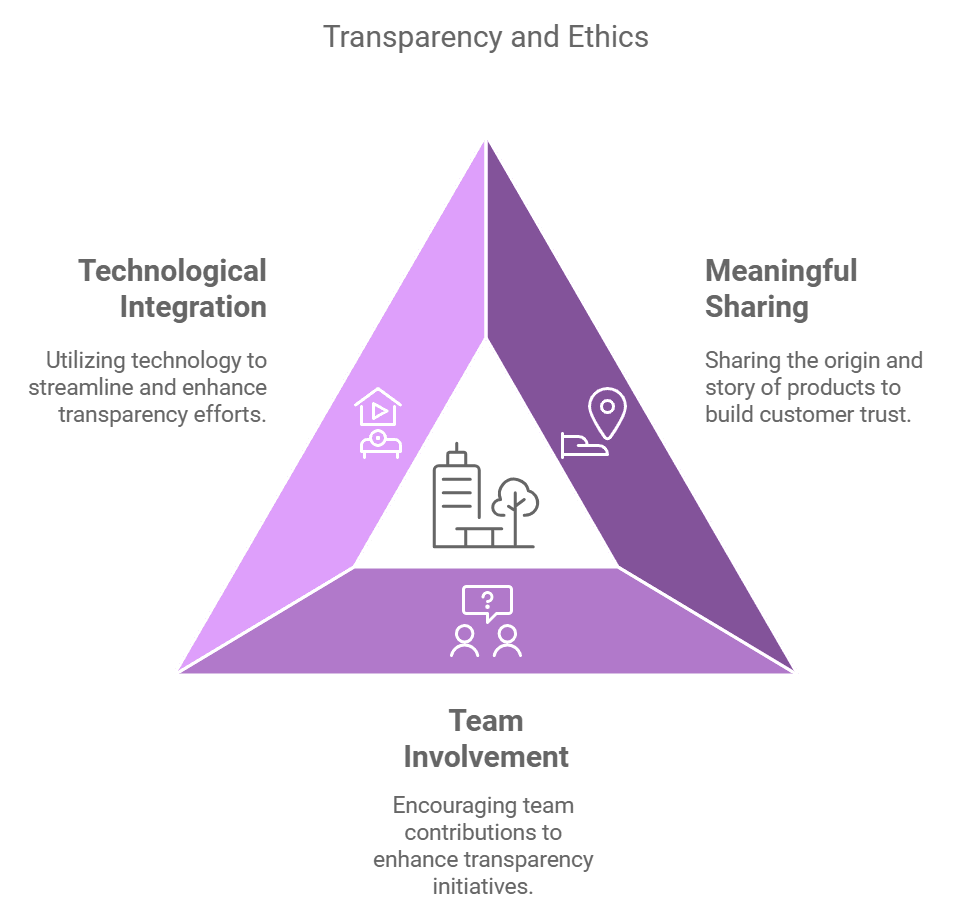Hello, I’m Asel Mamytova, a Swiss entrepreneur with over 15 years of experience helping businesses thrive in Switzerland and beyond. Running an online business is an exciting journey, but success today requires more than just offering great products or services. Customers are increasingly seeking brands that are transparent, ethical, and socially responsible.
Let me share what I’ve learned from building my business and working with others to create sustainable, trustworthy brands. Together, we’ll explore practical steps you can take to foster transparency and ethics in your online business, helping you build trust and long-term success.
Why Transparency Matters
In my experience, transparency is the cornerstone of trust. When customers and partners know you’re honest about your practices, they’re far more likely to support your business. It’s not just about being ethical; it’s also a smart strategy for growth.
For example, I’ve worked with a client who was struggling to build loyalty among their customers. By simply being upfront about their sourcing and production processes, they transformed how customers perceived them. Sales grew by 30% in a year because customers felt confident buying from a brand they could trust.
Key Benefits of Transparency
| Benefit | Impact |
|---|---|
| Enhanced Brand Reputation | Customers view your brand as trustworthy, ethical, and reputable. |
| Increased Customer Loyalty | Open practices build trust, leading to repeat purchases. |
| Attraction of Investors | Transparency attracts socially conscious investors who value ethics. |
Building a Culture of Transparency
Creating a transparent culture doesn’t happen overnight, but with intentional steps, you can make it the backbone of your business. Here’s how:
1. Communicate Clearly
Clear communication is essential, both with your team and your customers. For example, when my business launched a new consulting service, I made sure every detail—pricing, process, and expected outcomes—was spelled out on our website. The result? Fewer inquiries about the service and more direct bookings.
Tip: Use tools like internal messaging systems (Slack, for example) to ensure your team is always aligned. For customers, a well-designed FAQ page can work wonders.
2. Encourage Employee Feedback
Your employees are your business’s front line, and they often know what’s working—or not—before you do. Create an open-door policy where they can share feedback without hesitation.
One of my clients introduced monthly feedback surveys for their team. Within six months, they resolved several issues affecting efficiency and morale, leading to better performance and happier employees.
3. Be Open About Challenges
Transparency isn’t just about sharing the good stuff. Acknowledging mistakes or challenges can make your brand more relatable. When I faced delays on a client project, I informed them immediately and shared the steps I was taking to resolve the issue. They appreciated the honesty, and the relationship remained strong.
Sharing Information with Stakeholders
Transparency also means being open with the people who keep your business running—your stakeholders. This includes customers, investors, suppliers, and partners.
Financial Transparency
Be clear about your business’s financial health. Share reports or summaries that show how funds are used. For small businesses, this could mean explaining how pricing reflects fair wages or ethical sourcing costs.
Environmental Impact
As a business, you have a responsibility to minimize your environmental footprint. For example, when I started using recycled materials for my company’s printed materials, I made sure customers knew about it.
Ways to Share Environmental Impact:
- Highlight carbon footprint reduction efforts.
- Share waste management or recycling programs.
- Publicize partnerships with sustainable suppliers.
Supply Chain Transparency
If you sell physical products, supply chain transparency is crucial. Customers want to know that your goods are ethically sourced and produced.
The Role of Technology
Technology can be a powerful ally in building transparency. Tools like blockchain, for instance, allow customers to trace the journey of your products, from raw materials to delivery.
Example:
A client I worked with implemented blockchain to verify the sourcing of their luxury watches. This reassured their customers about the authenticity of their products and helped the business grow internationally.
| Technology | Benefit |
|---|---|
| Blockchain | Real-time supply chain visibility for customers. |
| AI and Machine Learning | Data analysis to improve customer communication and personalization. |
| Data Security Systems | Builds trust by protecting customer information. |
Embracing Ethical Practices
Ethics go hand in hand with transparency. By prioritizing ethical practices, you not only align with customer values but also create a business you can be proud of.
Fair Labor Standards
Ensure everyone involved in your business is treated fairly, from your employees to the suppliers you work with. This includes providing safe working conditions and fair wages.
Social Responsibility Initiatives
Giving back can make a significant impact. For example, my company donates a portion of profits to education initiatives in underprivileged communities. Not only does this help those in need, but it also resonates with socially conscious customers.
Real-World Case: How Transparency Transformed a Small Business
Let me tell you about Green Threads, a small online clothing store run by a friend of mine. They were struggling to compete with bigger brands. After working together, we implemented a few changes:
- Supply Chain Transparency: They began sharing details about their eco-friendly fabric sourcing.
- Customer Feedback Integration: A simple feedback survey helped them understand what their customers valued most—sustainable packaging.
- Open Pricing Model: By explaining how pricing supported fair wages, they built trust with their customers.
The result? Their sales increased by 50% within a year, and their customer reviews became overwhelmingly positive.
My Advice to You
Transparency and ethics aren’t just buzzwords—they’re the foundation of a successful, sustainable online business. Start small:
- Share something meaningful with your customers, like the origin of your products.
- Invite your team to contribute ideas for fostering transparency.
- Use technology to simplify and amplify your efforts.
Remember, building trust takes time, but the rewards are worth it. As a Swiss entrepreneur, I’ve seen firsthand how transparency transforms businesses—and I know it can do the same for yours.

If you need guidance on creating a transparent, ethical business, feel free to reach out. I’d love to help you on your journey. Together, we can make your business thrive!



